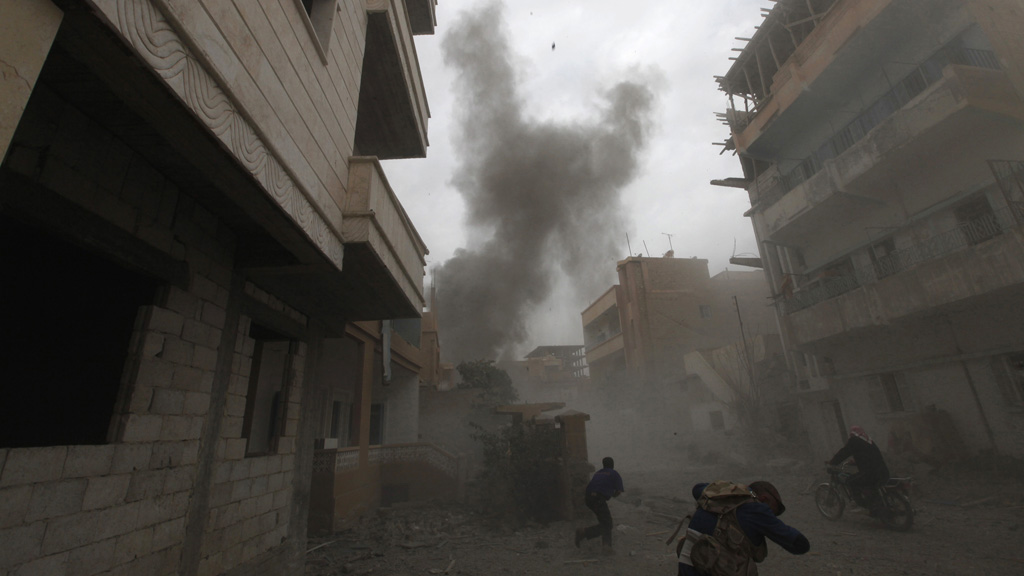Major Syrian rebel group unites with al-Qaeda
Jihadist rebel group in Syria Al-Nusra announces it has joined forces with al-Qaeda’s Iraq branch to form a dominant militant force in the fight against President Bashar Assad’s regime.
Jabhat al-Nusra officially announced that it was a part of the al-Qaeda branch, known as the Islamic State of Iraq, in a 21-minute video posted on a militant website.
Together the two groups will be known as the Islamic State in Iraq and the Levant. The Levant is the traditional name referring to the region from southern Turkey to Egypt on the eastern Mediterranean.
Abu Bakr al-Baghdadi, leader of the Islamic State of Iraq, said: “It is time to announce to the Levantine people and the whole world that Jabhat al-Nusra is merely an extension and part of the Islamic State of Iraq.”
Read more: Syria's Descent - the jihadist groups 'running the show' in Syria
He also said the Iraqi group was providing half of its budget to the conflict in Syria, and that Jabhat al-Nusra would not have a separate leader but instead be led by the “people of Syria themselves” – implying that he would be in charge in both countries.
Abu Mohammad al-Golani, leader of al-Nusra, said “the sons of Nusra Front renew their pledge (of allegiance)” to Jihad Ayman al-Zawahri, al-Qaeda’s worldwide leader.
Extremist rebels
The announcement comes two days after the leader of al-Qaeda, Ayman al-Zawahiri, urged Islamic fighters in Syria to unite in their efforts to oust Assad.
Al-Nusra is one of a number of extremist rebel groups fighting against government forces, which has been of concern to Western powers.
<a href=”http://www.channel4.com/news/the-battle-for-syria”><img src=”http://www.channel4.com/media/c4-news/images/special_report_620_images/SR_620Syria.JPG”></a>
The US and her European allies have tried to counter the rise of the extremist groups, such as al-Nusra, by supporting groups deemed to be more moderate, which have formed the Syrian National Coalition.
This support has included helping to coordinate shipments of new weapons to rebel groups, and providing training in Jordan.
For now, they need them. When everything is over, there’s going to be a huge fight over basically all of Syria. Bilal Saab, Institute for Near East and Gulf Military Analysis
It has been suspected for some time that al-Nusra was working with al-Qaeda and late last year the US placed al-Nusra on its list of terrorist organisations.
Syria will be at the top of the agenda for foreign ministers arriving in London today for a two-day G8 summit.
Military success
However, it is al-Nusra that has had arguably some of the most devastating impact on the government regime. It has a strong presence in the north eastern provincial capital of Raqqa pictured, below, now under rebel control, and has captured large parts of the Daraa province.
Al-Nusra has also claimed responsibility for a large number of suicide bomb attacks against government buildings in cities such as Aleppo and Damascus, and has captured a number of important military bases (see map, below).
Amongst other sites it has captured are a hydrodam and a prison, from which hundreds of prisoners were freed. It is also one of the groups battling to takeover Aleppo’s International Airport, one of the key sites in the war.
At the same time it has won the support of some Syrian people by providing communities with vital resources, such as bread and meat.
‘Huge fight’
Bilal Saab, director of the Institute for Near East and Gulf Military Analysis, North America, said the merger will make Jabhat al-Nusra an even more formidable force in Syria.
Read more: what weapons do the rebels have?
He said: “I think you’re going to have a pooling of resources, a more massive influx of fighters coming from Iraq into Syria. It will help them better position themselves in the period after Assad. It will certainly better help them defeat the Syrian regime more quickly.
“It does matter for them that they’re getting more material and more people and more expertise, especially Iraqi veterans who have really been vetted on the battlefield and who have fought coalition forces since 2003.

“Their thinking is ‘let’s deal with the problem right now of deposing the regime, and then take care of these rogue, radical elements later when we have international support’,
“For now, they need them. When everything is over, there’s going to be a huge fight over basically all of Syria.”
However, the merger will doubtless be sezied upon by President Assad, who has long claimed he is fighting a battle against terrorists, rather than rebels.
“It has the potential to backfire, and help marginalize the group from other fighting factions and from the civilian population,” said Elizabeth O’Bagy of the Institute for the Study of War.
